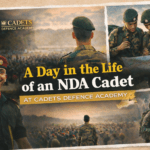15 Officer Like Qualities (OLQs): Your SSB Success Guide
15 Officer Like Qualities (OLQs): Your SSB Success Guide Table of Contents Getting that SSB call-up letter changes the game completely. You’ve already proven your intellectual might to the UPSC by clearing the grueling NDA, CDS, or AFCAT written exams. But crossing the threshold into the Academy requires more than just high scores—it demands true mettle and personality. It’s a steep climb; according to 2025 UPSC data, only an elite 1% to 2% of candidates actually clear the SSB process. Many aspirants ask me what are officer like qualities and why they matter so much. Basically, the SSB process is not a test of how much you can memorize. It is a pure personality assessment. They want to see if you have the core qualities of an officer in army. If you are looking for the OLQ full form, it stands for Officer Like Qualities. Understanding the OLQs meaning in SSB is your first step to success. Today, I am going to give you the complete list of 15 OLQs and show you exactly how to build them. No fake stories, no random expert opinions—just real information and actionable steps. Intellectual Qualities: Sharpen Your Mind First The first four qualities in the 15 officer like qualities list make up the foundation. Assessors test these primarily through your Officer Intelligence Rating (OIR) and Picture Perception and Description Test (PPDT). Let’s look at the officer like qualities definition for your intellect. Effective Intelligence This is not your textbook intelligence. Effective intelligence means your ability to solve practical, real-world problems. When you look at how SSB tests OLQs, they want to see if you can use the resources around you. Real Data: The top 30% scorers in the OIR test usually clear the intellectual tests easily because they spot patterns fast. In real combat, officers use effective intelligence to read complex maps and fix operational issues on the go. Action steps: Solve 50 basic reasoning riddles daily to train your brain. Stop using Google Maps for familiar routes; learn to navigate mentally. Review your logical errors weekly. Reasoning Ability Reasoning ability is how logically you can break down a situation. This is one of the most critical top OLQs in Indian army. Real Data: If you just argue emotionally in a Group Discussion, you get negative marks. Assessors look for candidates who analyze the “why” and “how” of a problem. Action steps: Read editorial sections of newspapers daily. Debate with friends using solid facts, not feelings. Time your logic puzzles to improve thinking under pressure. Organising Ability An officer must manage men, material, and time. If you cannot organize your own life, how will you organize a platoon? This is a huge part of the OLQs in SSB interview. Real Data: Around 70% of rejected candidates fail their group tasks because they make chaotic, unorganized plans. In the Group Planning Exercise (GPE), your written plan shows exactly how organized your mind is. Action steps: Plan your day in advance every single night. Organize small events or trips for your family. Keep your study space clean and systematic. Power of Expression You might have a brilliant plan, but if you cannot explain it to your team, it is useless. This trait is essential when looking at the qualities of an officer in army. Real Data: Clear words win trust. In the Lecturette, candidates who speak clearly for 3 minutes score significantly higher than those who use heavy vocabulary but stutter. Action steps: Practice 5-minute impromptu speeches in front of a mirror. Get brutal feedback from your peers on your body language. Write a daily journal to clear your thoughts. Social Qualities: Build Team Bonds The next set in the list of OLQs for SSB focuses on social adjustment. You cannot survive in the armed forces if you are selfish. These Officer Like Qualities (OLQs) shine brightly in GTO tasks. Social Adaptability This means adjusting to new environments and different types of people. You will be serving with jawans from all over India. Real Data: Teams that adapt to each other quickly finish their tasks 40% faster. Assessors watch how you interact with strangers on Day 1. Action steps: Join clubs or study groups weekly. Listen twice as much as you talk. Talk to people outside your usual friend circle. Cooperation Cooperation is about “We” instead of “I”. It is a major factor in OLQs assessment in SSB. Real Data: In group obstacles, candidates who only try to show off themselves usually fail. The one who pulls the shy member forward and supports the group gets selected. Action steps: Share credit whenever your team wins. Play team sports like football or volleyball regularly. Help your classmates without expecting anything in return. Sense of Responsibility When we talk about the army officer qualities list, this is the backbone. It means taking full ownership of your duties. Real Data: Over 80% of successful military leaders are known for owning their tasks fully. If a senior fails, a responsible junior steps up without complaining. Action steps: Finish all your promises on time. Volunteer for the tough jobs no one else wants to do. Track your commitments on a calendar. Dynamic Qualities: Take Bold Action These qualities drive your decision-making. If you want to know the officer qualities for AFCAT, NDA, or CDS, pay attention here. Initiative Are you a self-starter? Taking the first step when everyone else is confused shows real initiative. Real Data: Confident, proactive decisions win 65% of simulation tasks. In the GTO, the person who starts tackling the obstacle while others are just staring often gets the plus points. Action steps: Start small projects completely solo. Don’t wait for your parents or teachers to tell you to study. Raise your hand first when a question is asked. Self-Confidence You must trust your own abilities. This is a very vital Officer Like Qualities (OLQs) because troops will not follow a leader who doubts himself. Real Data: During the personal interview, the Interviewing Officer will put









